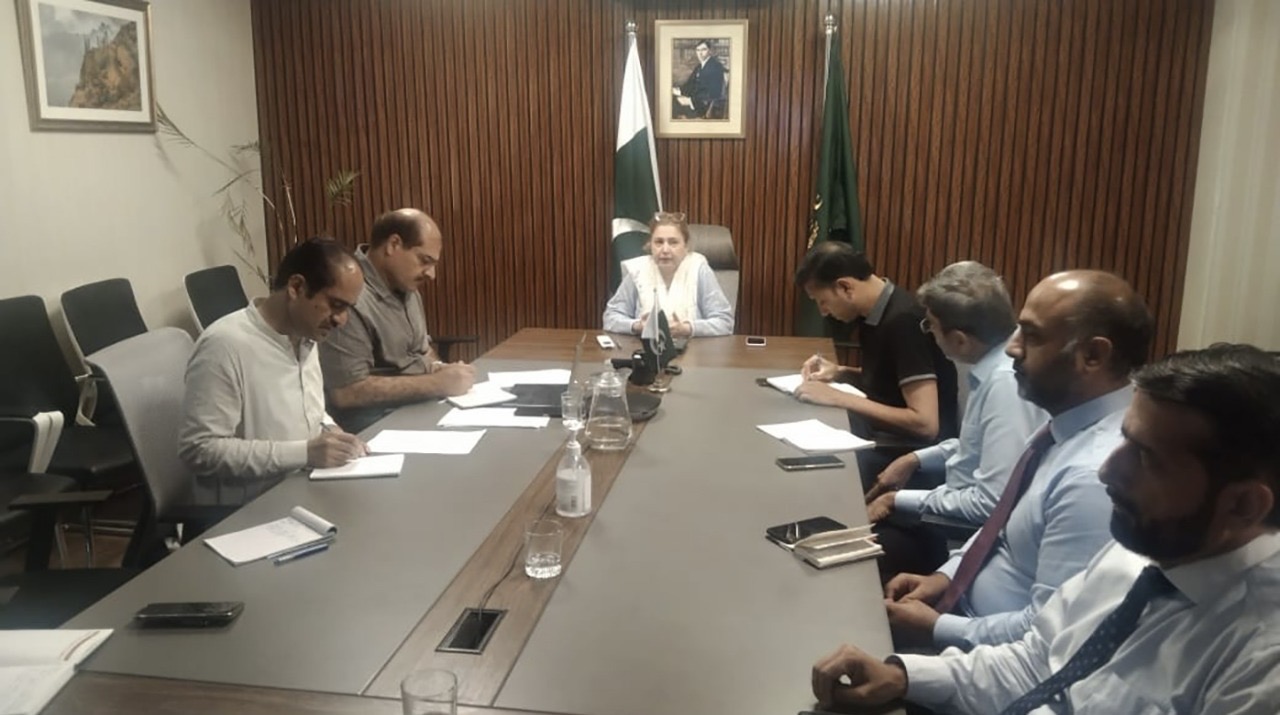 ISLAMABAD, August 1, 2025 (Kamran Raja): Top key representatives of the State Bank of Pakistan and all commercial Banks operating in the country at a high-level consultative meeting mulled over viable consumer financing options and financial support mechanism for unfettered and rapid adoption of electric vehicles (EVs).
ISLAMABAD, August 1, 2025 (Kamran Raja): Top key representatives of the State Bank of Pakistan and all commercial Banks operating in the country at a high-level consultative meeting mulled over viable consumer financing options and financial support mechanism for unfettered and rapid adoption of electric vehicles (EVs).
This was stated by Media spokesperson for the Ministry of Climate Change and Environmental Coordination in a press statement issued here on Friday.
The spokesperson, Mohammad Saleem Shaikh, said that the representatives of the country’s banking sector at the meeting with the Ministry of Climate Change and Environmental Coordination (MoCC&EC), pledged all-out measures to explore and introduce workable consumer financing facilities to support the present government’s commitment of fast-tracking transition to electric mobility and enable potential buyers to afford the electric vehicles as an affordable, sustainable and environmental-friendly mode of travel.
He said that meeting also agreed to constitute working group of representatives of bank sector, EV manufacturers, assemblers and importers as well as representatives of MoCC&EC and other relevant government organsations to come up with a proposal for green consumer financing options and financial support mechanism adoption of electric vehicles (EVs) in the country.
The meeting, chaired by MoCC&EC Secretary Aisha Humera Moriani, also discussed various strategies to phase out aging fossil fuel-run vehicles by imposing taxes so as to make them unfeasible vehicles as a part of government’s efforts to accelerate the transition to electric mobility.
Chairman Pakistan Banking Association (PBA) Zafar Masud and over 70 representatives of different financial banks, local EV manufactures and importers, relevant government and non-governmental organisations also attended the meeting.
Highlighting the unprecedented significance of the easy and affordable financing facilities for adoption of EVs in the country, the secretary Ms. Moriani cautioned, “Without workable and affordable consumer financing schemes for potential households with desiring for switching to EVs, the adoption of EVs will remain to move at the slow pace.”
She urged the country’s banking sector to come forward with various attractive consumer financing plans for potential buyers. Because, without the banking sector’s proactive role in this regard, transition to EVs at all levels in the country is unlikely to pick up the pace to mitigate transport sector’s climate-altering carbon emissions, the MoCCEC secretary Aisha Humera Moriani cautioned.
She also suggested that imposing burdensome taxes on old fossil fuel-powered old vehicles is crucial to make such vehicles unattractive and make room for fast adoption of EVs in the country.
The Chairman Pakistan Banking Association (PBA) Zafar Masud assured of all-out support and contribution on behalf of the banking sector to sit together with key representatives of interested banks and discuss with possibilities for rolling out viable financing schemes to ramp up EV adoption in the country.
He informed the meeting that The Punjab government, in collaboration with Bank of Punjab (BoP), has already launched distribution of 18,000 bikes, 5000 of them EV bikes, to students on interest-free monthly loans under the Punjab Chief Minister’s Youth Initiative. Zafar Masood, who is also Bank of Punjab’s president.
The scheme aimed to provide students with affordable and convenient transportation for their education. The distribution includes both electric and petrol bikes, with the government covering the interest on easy installments, he highlighted.
He suggested that the initiative has been widely responded by parents of the students and can be adopted by other banks in Sindh, Balochistan, Khyber-Pakhtunkhwa, Gilgit-Baltistan and Azad Jammu and Kashmir regions as a part of the present government’s vision for transition to EVs.
Secretary, MOCC&EC urged that the other provinces particularly Sindh province should replicate the initiative of the Govt. of Punjab for the promotion of EVs in Sindh with the joint venture of commercial banks. The EV manufacturers on their own should also consider launching the banking like financing of EVs to the end users through installments on banking models schemes, she said.
Director General MoCC&EC Muhammad Asif SahibZada highlighted that first Green Taxonomy Framework has been approved on July 25 by the Economic Coordination Committee to promote environmentally sustainable investments across the country. The model will support eco-friendly projects by enabling targeted financial support, she emphasised.
“While the Green Taxonomy Framework aims to help policymakers, financial institutions, and investors direct funds into genuinely sustainable activities, banking industry should also tap into it and introduce green loan schemes for promotion of adoption of EVs in the country,” the DG MoCC&EC Asif Sahibzada said.
Director (Urban Affairs) Muhammad Azim Khoso highlighted the dividends of the EVs’ adoption in particularly urban areas of the country, which account for major share in overall transport sector-related heat-trapping carbon emissions.
He noted that urban centers in Pakistan such as Lahore, Karachi, Rawalpindi and Islamabad consistently rank among the most polluted cities in the world, with transportation being a major contributor to harmful pollutants like PM2.5 and nitrogen oxides (NOx).
“Therefore, the widespread adoption of electric vehicles (EVs), which produce zero tailpipe emissions, offers a practical solution to this crisis by significantly improving air quality. Besides, cleaner air would, in turn, help reduce the incidence of respiratory and cardiovascular diseases, easing the public health burden on already strained healthcare systems,” the MoCC&EC’s director urban affairs remarked.